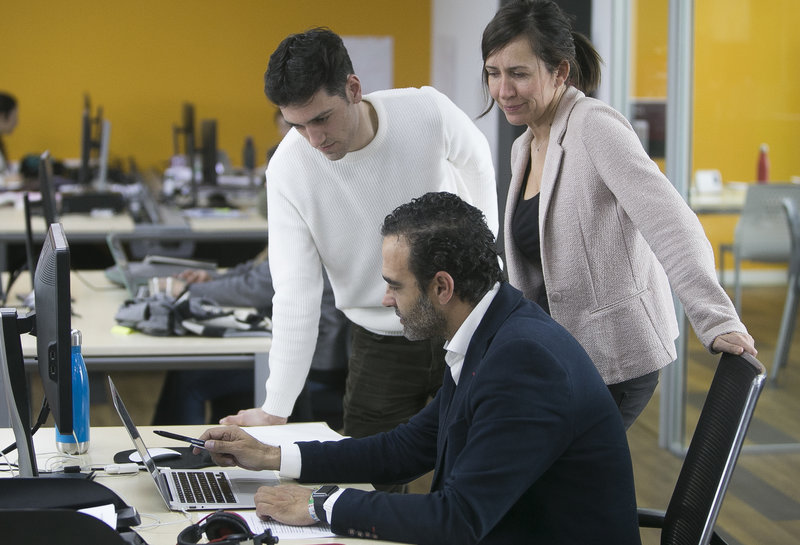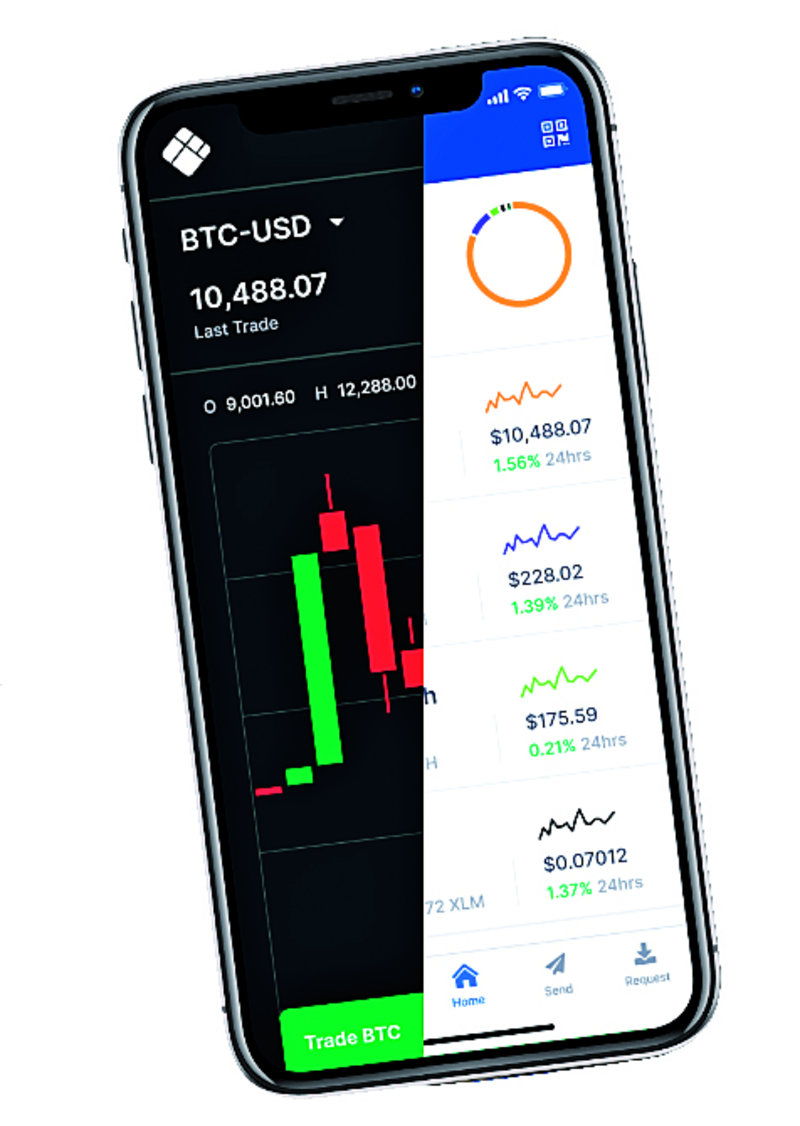Blockchain, far beyond bitcoin
The technology created for cryptocurrencies is already being applied to other sectors. In Catalonia alone, there are 76 firms using blockchain, while global investment in the technology will soon exceed €11.2 billion
the users are the ones who control the data Today, 68% of Catalan blockchain companies are start-ups
Bitcoin, the worlds est-known cryptocurrency, shows that we can pay for things electronically without the need for banks or official currency. However, it has also led to the development of a technology now being applied to other sectors. Those who understand it say it will revolutionise everything, because it eliminates intermediaries and allows for secure transactions, whether financial or not. This technology is called blockchain, and in Catalonia alone there are already 76 companies devoted to it, double the number a year ago.
In general terms, the blockchain system is a decentralised digital platform or large database that is made up of chains of blocks (hence the name) that serve as containers for highly-secured data, as they are designed to prevent the information they contain from being erased or modified. Everything is registered and there is no one organisation that has total control over the information, as the users are the ones who control the data, which have to be validated by all of them. That makes transactions more trustworthy, because they are certified by all users and once validated cannot be changed. The Girona company Montsoliu, which specialises in organic eggs, is already using the platform to increase transparency and allow customers to scan QR codes on their packaging to find out such things as what the hens ate, what day and time the eggs were collected, and when they were sent to the supermarket. Behind this innovative new system is the Vottun start-up in Sant Cugat.
Marta Vallès is a founding partner of Vottun, which was set up two years ago. Vallès explains that a great thing about the technology is that it can be used as a “digital notary”. “It’s like a bank book: there might be the same amount in it, but every single transaction is recorded,” she says, adding that another advantage is that “while a server, a government, or Amazon now has all your data, with blockchain there are a thousand nodes sharing the same information, but without one person owning it. And your data cannot be misused.” That means, for example, that if an academic qualification is certified with the system, it will prevent cases like that of Cristina Cifuentes’ non-existent Master’s degree. “The information about marks, classes taken and their dates could not be manipulated. And in the case of someone entering erroneous data, you’d know who did it,” she says.
One of the top hundred
Vallès explains that her company is a platform for certifying and tracing data. “We help to trace the life of something, which could be eggs – as with Montsoliu–, car parts, renewable energy certificates, or any other item or service,” she says. Vottun helps companies develop blockchain applications and is now working with Naturgy and the Santander and Sabadell banks. To help explain what they do, Vallès talks about the potential of these applications for trade: “Right now, to send goods to China, you need 20 documents that get passed from person to person along the logistics chain. You avoid that with blockchain, because all the information is added to the system and everyone knows it’s correct and can’t be modified.” In April, Vottun will be at the finals of the annual prizes given by the Massachusetts Institute of Technology, as one of the hundred best start-ups in the world.
A study by the government’s business promotion agency, Acció, says blockchain technology accounts for 400 jobs in Catalonia today, with a turnover of €9.46 million. It is estimated that the industry will have a worldwide turnover of €11.2 billion within two years.
For Carles Gómara, Acció’s Head of Innovation, it is a sector that is going through an exploratory stage, which means a lot of companies are studying how this innovation can be applied to different sectors. “Blockchain was invented for bitcoin,” says Gómara, “and although it’s not quite so ideal as it is for cryptocurrencies, people see it as an interesting technology and are trying to apply it to other spheres.” Within five years we will see the concentration stage, which means “firms will have seen which sectors it makes most sense to apply it to and focus their efforts there.”
Today, 68% of companies in the Catalan blockchain ecosystem are start-ups, such as the one headed by Sergi Juanati and Marta Abadia. For years, the two worked in large multinational firms, implementing technology projects. “We had good salaries and a lot of incentives, but we weren’t doing anything we were passionate about,” says Juanati, who adds: “When it comes to innovating, there are limitations in large companies, because everything has to go through hierarchical filters and it’s hard to get budgets approved. If you want to work in areas like machine learning, the Internet of Things, or other disruptive technologies, you need the agility and flexibility of start-ups, which prioritise concept testing and devote all their resources to innovating.” That is why, at the end of last year, Juanati and Abadia set up their own company, Bitacoras. The long-term aim is to use blockchain technology so that everyone has control over their own medical records and can even profit from it.
As the co-founder of Bitacoras explains, each patient’s information is now “distributed among multiple computers and neither the patient nor their doctor has an overall view,” something that makes diagnosis more difficult. “Thanks to blockchain,” says Juanati, “the doctor would have access to all the previous information that is now dispersed and would know not only about previous illnesses and which medicines the patient has taken, but could even, with consent, link the data with the records of the patient’s parents to predict the risk of hereditary conditions.”
Yet this is only the beginning for Bitacoras, which also aims to foster research and give patients’ records value (so they get the benefits and not third parties, as happens now). To do this, the company proposes that patients turn over their records so they can be used “in a secure and anonymous manner” to speed up research.
Víctor García Font, IT professor at Catalonia’s Open University, points out that cryptocoins are units of value that an organisation creates to give more power to its users, for example, by linking the money to certain incentives. This can be seen in the case of Vilawatts, the digital money of Viladecans.
technology
Automatic discounts
The Vilawatt incentive system using blockchain has just been implemented in Viladecans. It is a local authority initiative developed by the Igualada company, Ubiquat, whose CEO, Jaume Catarineu, explains that this means of payment has been designed to boost energy transition. It will soon offer benefits to locals who install solar panels or park on the outskirts of town and use public transport to get into the centre, for example. As Catarineu explains, thanks to the platform, residents will no longer have to present paperwork accrediting their consumption of green energy, as blockchain will connect up all the parties involved and instantly show whether the user has a right to incentives. It can even automatically issue a free ticket for parking or to the local swimming pool. Ubiquat, set up in 2008, has also developed the Grama digital currency for Santa Coloma de Gramenet, and the firm is in contact with other local authorities and bodies who want to develop their own cryptocoins.






